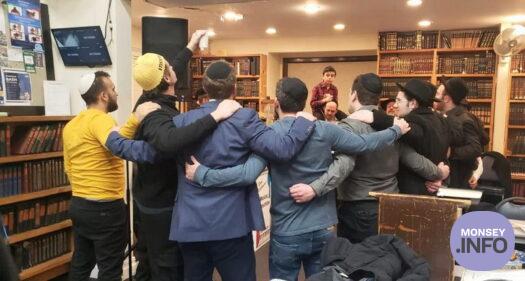
As Observance Soars After Oct. 7, Baalei Tshuva Flood Passaic Yeshiva
After the October 7th terror attack on Israel by Hamas, many Jews responded with a dramatic increase of interest in religious observance. This resurgence is consistent with recent research findings that the experience of “loss during war increases religiosity.” Many secular Jews are seeking expressions of Jewish identity they never felt before, increasing synagogue attendance, lighting candles, and spawning a global shortage of tefillin and mezuzahs. A recent survey of 211 Chabad rabbis found 86% reported seeing increased synagogue and program attendance since the attack, and 98.6% reported seeing an increase “in personal practice related to Jewish traditions and observances among community members.”
Amid this great awakening, a small yeshiva in Passaic is suddenly bursting at the seams, flooded with newly observant adults, or baalei teshuva. Yeshiva Ner Baruch Passaic Torah Institute (PTI) was founded by Rabbi Shlomo Singer with the belief that “every Jew belongs in a yeshiva.” He developed a method to make rigorous in-depth learning accessible, even to people with limited background. “We pitch Torah at a very high level, but make it accessible no matter what your background,” says Rabbi Singer. There are dozens of programs for men and women and multiple levels of day and night classes, from the rote beginner to the most advanced student.
Rabbi Singer has spent a life in kiruv, literally from birth, when his rabbinical father’s dream was to find a pulpit “where there is no frumkeit,” landing in a coal mining town in Pennsylvania. Rabbi Singer developed a prototype of accessible inclusive learning while employed as a shul chazan. Upon retiring, he started PTI in his dining room and soon moved to its current location in a converted Mediterranean style house.
Just since the terror attack, an explosion of new 20 and 30-somethings has overrun the yeshiva, stretching its capacity to the limit and necessitating plans for a larger building.
Recruiting this new influx is Ben Rand, 32, who himself has been at PTI a matter of months after a stint at Aish Hatorah in Jerusalem that changed his life. “This is a strange time for the Jewish people and for the whole world. One major disruption after the other. It defies reason–the world blaming victims for their own massacre, antisemitism in the name of civil rights, the double standard for Israel, political extremism, COVID,” Rand says. “The world has lost all of its values and a lot of us are asking why all this is happening. It’s like a spiritual alarm clock. The only reason Jews are still here is G-d. We feel a call to action, a need to find our purpose.”
Surprisingly, Rand discovered only after starting at PTI that his father and uncle had studied at PTI during the yeshiva’s infancy many years ago. It was their ties in the construction field that originally converted the house into a yeshiva. Indeed, the original generation of PTI learners came during the golden age of kiruv, returning “on fire” from new outreach yeshivas like Aish and Ohr Somayach. They feel they’re mentoring younger versions of themselves in this incoming generation. “It brings back memories of the most exciting time of my life,” recalls Shmuel Brodsky,” who followed a similar path decades ago. “This is a place to inspire and be inspired.”
The latest addition to the PTI lineup is the Young Professionals program, coordinated by Rand. The group meets every Thursday night. It features a free hot buffet, guest speakers, guided group learning, and always concludes with a musical kumzits that builds the camaraderie and momentum of the group. It just concluded a successful shabbaton and plans another in early 2024.
Integrating the daunting number of PTI’s new programs and students into the greater yeshiva is Rabbi Baruch Bodenheim, Associate Rosh Yeshiva and long-time columnist in the Jewish Link and Monsey Mevasser. Rabbi Bodenheim has been racing to keep up with the rush of new entrants by creating more programs for men and women, recruiting teachers and volunteers, and upgrading technology and communication systems.
Welcoming the new entrants, he set the tone, “It’s an upside-down world where bad is seen as good, and good is seen as bad. Yehivas are a haven of sanity and the Torah is the one place of truth. The Jewish world is feeling we’re all in this together as one people, and you men are taking up the calling.”
There is learning literally around the clock, day and night seven days a week, including four levels of gemara learning in the evening, morning programs for retirees, a day kollel of advanced scholars, Sunday shiurim, Zoom classes for distance learners, distinguished speakers series, chavrusas, and programs for women all week. Everything is free.
“Come in and we’ll find a shiur that fits your background, interest, and schedule,” invites Rabbi Bodenheim.
To meet the demand for programming while running a new building campaign isn’t an easy task. As the website PTI.shulcloud.com promotes the upcoming annual dinner, a greater than normal turnout is also anticipated as people recognize the relevance of PTI in these troubled times.
Summing up PTI’s place in the trend, Rabbi Yitz Greenman, a 40 year veteran of numerous kiruv programs including as former Executive Director of Aish Worldwide, reflects, “There is great confusion in the world now, with double and triple standards facing the Jewish people and many are wondering what is happening and why. The Torah is the source of moral clarity and provides the answers that people are looking for. We must share the meaning, relevance and depth of Torah with every member of our tribe, and right now! That’s PTI.”
For more information visit https://pti.shulcloud.com or call/text Rabbi Bodenheim at 862-371-3816 or Ben Rand at 201-280-8145. YNB-PTI is located at 441 Passaic Avenue in Passaic, NJ.









